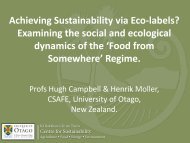Book of Abstract (incl. addendum) - IFSA symposium 2012
Book of Abstract (incl. addendum) - IFSA symposium 2012
Book of Abstract (incl. addendum) - IFSA symposium 2012
You also want an ePaper? Increase the reach of your titles
YUMPU automatically turns print PDFs into web optimized ePapers that Google loves.
Workshop 2.3 Systems thinking and practice in rural innovation: advances in concept,<br />
methodologies and interventions<br />
sustainability. IWRM articulates multi-stakeholders’ participation and social learning to foster an<br />
innovative and transformative approach towards environmental change. Using qualitative field data<br />
from the rainfed Matruh region in Egypt, this paper evaluates the contribution <strong>of</strong> stakeholders’<br />
participation in advancing IWRM with regards to equitable allocation, empowerment and<br />
sustainability. It analyses whether stakeholders’ participation fosters a sustainable use <strong>of</strong> natural<br />
resources. It argues in its case study that the politics <strong>of</strong> water management are seldom considered in<br />
IWRM. Consequently, equity and empowerment gains are captured by power differentials, which thus<br />
constrains its sustainability potential. By doing so, it expands the literature on IWRM with a political<br />
sociology angle.<br />
Finding farmers' motivation - a key to sustainable farm development<br />
through interventions<br />
Jenny Höckert and Magnus Ljung<br />
Swedish University <strong>of</strong> Agricultural Sciences, Sweden<br />
Jenny.Hockert@slu.se<br />
Recent studies show that the viability <strong>of</strong> Swedish farms lies below the long-term sustainable level, a<br />
negative trend over the last 10 years. Different actors within the agricultural sector have responded by<br />
trying to stimulate farmers' entrepreneurship and innovative capacity. We argue that one can identify<br />
four distinct phases.<br />
The first phase, beginning fifteen years ago, was when the Swedish Farmer’s Federation (LRF)<br />
launched the competence project “The Farm Business Manager”. One central part was to pinpoint the<br />
distinction between the farm manager's life idea and his business idea. A broader view on farmers’<br />
motivations and driving forces were introduced. In the second phase, starting in 2000, the focus shifted<br />
towards external cost reductions, arguing that better preconditions for rural entrepreneurship and<br />
innovation were needed to motivate farmers to take action. But not much happened within the farming<br />
community.<br />
In 2006 a new advisory concept was borne; “Future dialogues”. The debate within advisory<br />
services shifted from farmer’s attitudes, values and preconditions, toward the learning process that<br />
farmers needed to be engaged in. Later this third phase developed into business coaching. The fourth<br />
phase, beginning in 2009, can be conceptualized as the introduction <strong>of</strong> lean production. It is understood<br />
as a way to change the whole mindset <strong>of</strong> the farmer, while simultaneously taking incremental actions.<br />
We critically examine the development <strong>of</strong> advisory concepts in Sweden, which reflects a lack <strong>of</strong><br />
basic understanding <strong>of</strong> learning, change, and innovation among farmers. The common denominator for<br />
most initiatives is well grounded, in that they focus on the farmer’s motives and capabilities. But<br />
similarities between concepts are put in contrast to a relative low level <strong>of</strong> success. Our main argument<br />
is that a deeper and systemic understanding <strong>of</strong> farmers' lifeworld and Weltanschauung is necessary.<br />
Some recommendations for extension competence and policy are given.<br />
Development-led innovation?: Concepts and challenges in changing<br />
agricultural RD&E systems in Australia<br />
Ruth Nettle, Pauline Brightling and Anne Hope<br />
University <strong>of</strong> Melbourne, Australia<br />
Ranettle@unimelb.edu.au<br />
Models <strong>of</strong> rural innovation have evolved over time with much current interest in the systems and<br />
arrangements that balance knowledge production/technology development with end-users and<br />
practitioner adaptation. Strong network linkages amongst innovation actors in co‐developing new<br />
technologies or social learning for systemic change is a suggested design feature for agricultural and<br />
42











